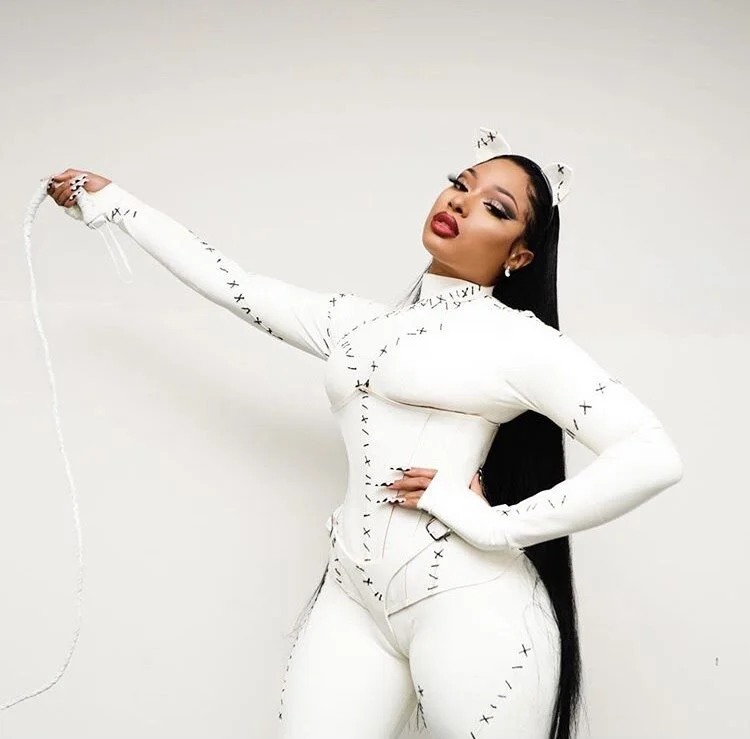Megan Thee Stallion Demands We Protect Black Women
The rapper’s SNL debut highlights ongoing calls for racial justice across the country
On the opening night of Saturday Night Live’s (SNL) 46th season, rapper Megan Thee Stallion delivered a standout musical performance, signaling her well-earned rise to the top.
The 25-year-old, born Megan Pete, showed off her slick lyrical ability in “Savage” and even surprised guests with an appearance from Young Thug for their collaboration on her newest single, “Don’t Stop.” But the rapper’s performance was made all the more captivating by her resounding support for the protection of Black women, specifically calling out Kentucky Attorney General Daniel Cameron’s mishandling of Breonna Taylor’s death.
Pete’s SNL debut comes on the heels of a difficult summer, where her own image was thrown into the spotlight when she revealed that she had been shot by her close friend and rumored boyfriend, Tory Lanez.
Pete accused fellow recording artist, Lanez, of shooting her in the feet after a party in the Hollywood Hills on the morning of July 12. Los Angeles Police Department officers responded to reports of gunshots in the neighborhood, and after arriving at the scene they arrested Lanez for possession of a concealed weapon in a vehicle.
Pete was rushed to Cedars-Sinai Medical Center for a gunshot injury, and underwent surgery immediately to remove the bullet fragments.
Despite several sources confirming the hospital records, which clearly stated her injury was the result of a gunshot, celebrities and fans were quick to mock her story on social media.
Media personality and reality TV star, Draya Michele compared the two rappers to Bobby Brown and Whitney Houston’s tumultuous and abusive relationship. "I predict that they had some sort of Bobby and Whitney love that drove them down this type of road," Michele said during a podcast episode. "I'm here for it. I like that. I want you to like me so much you shoot me in the foot too."
Pete quickly swung back against Michele on Twitter, but the damage had been done. Rumors began to circulate about the validity of her story, and fans of both rappers claimed that Pete was likely the one to provoke Lanez in the first place.
Through the media’s coverage and extensive analysis of Pete’s accusations, Lanez remained silent through it all–choosing neither to confess nor deny the abuse claims.
But the artist broke his public silence on Sept. 24, surprising followers with a dramatic reveal of his new album, “DAYSTAR.”
“There is a time to stay silent. And a time to speak ..... I said all I could say on this ... ALL PLATFORMS ... ..... #DAYSTAR ... I’ll be back to y’all soon .... respectfully ...” Lanez tweeted over two months after the shooting.
Nearly every song in the 17-track project fervently denies Pete’s claims that Lanez shot her. In the opening track he even says, “how the f*ck you get shot in your foot, don’t hit no bones or tendons?”
The rapper’s attempt to promote his album by exploiting the trauma of Pete’s experience for financial and cultural gain did not work out in his favor. Both Apple Music and Spotify proved their industry might after blocking promotional content for “DAYSTAR” and removing it from editorial playlists, which helps new music reach a wider audience in the first few days after its release.
But Lanez’s actions reflect a consistent tendency to minimize Black women’s pain.
Back in 2009, Rihanna endured a similar run in the spotlight when Chris Brown viciously assaulted her. Despite both Rihanna and Pete’s widely successful careers, they were endlessly ridiculed for sharing their experiences.
The two women were assumed to have done something to their partners that would justify the abuse. Mainstream media painted them as hysterical, in some cases going so far as to say that the women deserved what they got.
Pete’s testimony was manipulated into memes and many of her peers assumed she had overreacted to her injuries.
Even after posting an honest reflection of her feelings on Twitter, many continued to mock the rapper and stand behind Lanez instead.
"Black women are so unprotected & we hold so many things in to protect the feelings of others w/o considering our own," Pete tweeted. "It might be funny to y’all on the internet and just another messy topic for you to talk about but this is my real life and I’m real life hurt and traumatized."
Pete’s SNL performance picked up on similar themes, and even included clips from Malcolm X’s recognizable speech, “Who Taught You to Hate Yourself?”
“The most disrespected, unprotected, neglected person in America is the Black woman," the recording sounded.
Unfortunately, Malcolm X’s words are just as relevant now as they were back in 1962.
Pete’s experience defending herself in the media proves that Black women have to work twice as hard to convince people that their pain is legitimate. It is an unfriendly reminder that Black women are constantly left unprotected, even by their own community.
